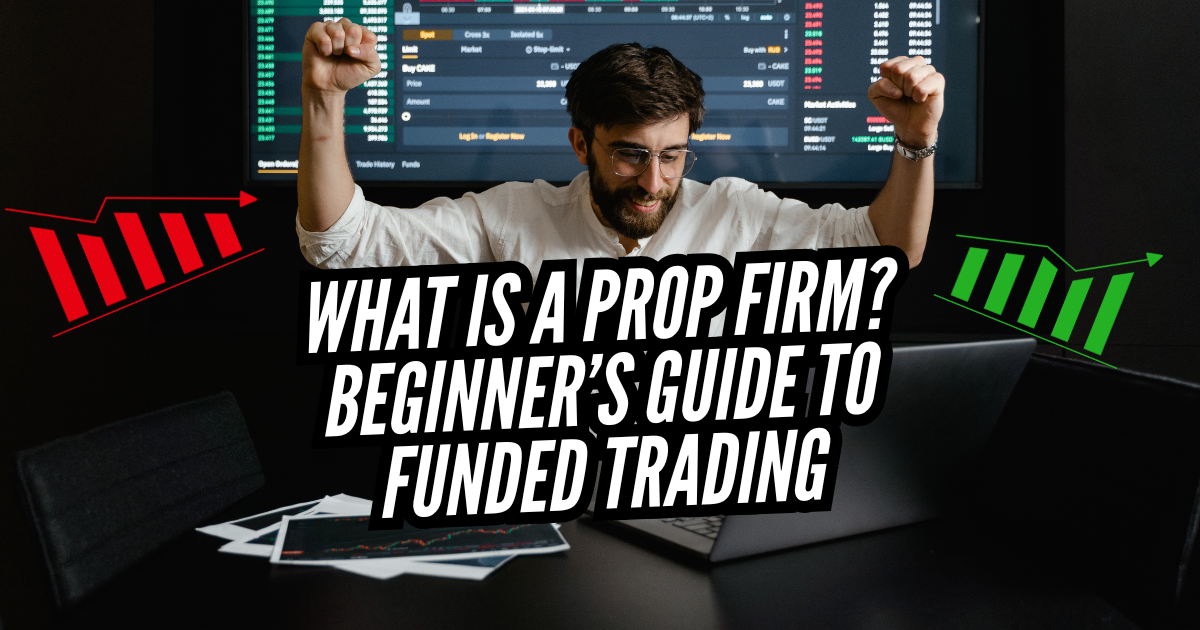
What Is a Prop Firm? Beginner’s Guide to Funded Trading
Introduction
Trading with your own money can be stressful. Many traders dream of scaling up but lack the capital to trade big positions. This is where proprietary trading firms (prop firms) step in.
A prop firm provides traders with access to the company’s capital after they prove their skills. In exchange, the firm keeps a share of the profits. This model has become extremely popular thanks to online funded accounts that give traders access to tens of thousands of dollars with just a small upfront fee.
What Is a Prop Firm?
A proprietary trading firm is a financial company that uses its own money to trade markets like forex, futures, stocks, or crypto. Unlike brokers, they don’t earn from commissions or spreads but from trading profits.
In the modern retail model, prop firms allow individual traders to trade their capital after passing an evaluation or challenge.
👉 According to Investopedia, proprietary firms “seek profits for themselves rather than clients,” which is why they can provide traders with direct access to capital without acting like a broker.
👉 Nasdaq highlights that funded trader programs are designed to let traders “access larger pools of capital without risking their own funds,” making them popular among retail traders.
How Do Prop Firms Work?
Most modern prop firms follow a funded challenge model:
- Sign up & pay an evaluation fee
- Pass the evaluation
- Get funded
- Trade live & split profits
👉 The Corporate Finance Institute (CFI) explains that firms benefit by recruiting talented traders but also generate significant revenue from evaluation fees, since many traders fail challenges.
Types of Prop Firms
| Type | Description | Example |
|---|---|---|
| Traditional prop firms | Traders work in an office, undergo training, and may need to deposit capital. | Jane Street, DRW |
| Retail funded firms | Online platforms where traders pay for challenges and trade from home. | FTMO, Bulenox, Take Profit Trader |
Pricing Models Explained
Each firm has its own structure, but here are the common ones:
- One-time challenge fee: $100–$700 depending on account size.
- Monthly subscription: Some firms charge ongoing access fees.
- Profit split: Usually 70/30 to 90/10 in favor of the trader.
- Scaling plans: Firms may double capital for consistent traders.
👉 According to Nasdaq, fees are often the firm’s main revenue stream since most traders don’t pass evaluations.
Pros of Trading with a Prop Firm
✅ Access to large capital
✅ Lower upfront risk
✅ Structured rules
✅ Scaling opportunities
✅ Community and support
👉 On Reddit, traders often mention that “prop firms give them the confidence to trade larger sizes” without personal fear of loss.
Cons of Trading with a Prop Firm
❌ Strict rules
❌ High failure rate
❌ Payout disputes
❌ Revenue from failures
❌ Scam risks
👉 On Trustpilot, some traders reported payout delays or denied withdrawals with certain firms.
👉 Several Reddit threads argue that firms design rules to maximize challenge failures.
👉 On X (Twitter), traders warn about firms that use “fake payout screenshots” to attract clients.
Real Trader Feedback
- Trustpilot Reviews (2023): Many traders praise firms like FTMO for fast payouts, but others complain of sudden account closures after reaching profit targets (Trustpilot).
- Reddit (r/Forex): Users emphasize that “95% of traders fail prop firm challenges,” often due to unrealistic drawdown rules (Reddit).
- Twitter/X: Traders caution newcomers to verify firms’ payout proofs before signing up (Twitter).
How to Choose a Trustworthy Prop Firm
- Reputation — Check Trustpilot, Reddit, and review blogs.
- Transparency — Rules and payouts should be clear.
- Proof of payouts — Look for verified traders showing receipts.
- Trading conditions — Platforms, spreads, and execution quality matter.
- Support — Responsive customer service is key.
Quick Pros & Cons Table
| Pros | Cons |
|---|---|
| Access to large trading capital | Strict rules and constraints |
| Small upfront cost | High failure rate |
| Profit-sharing opportunities | Payout disputes reported |
| Structured risk management | Firms profit from failed challenges |
FAQs
1. Are prop firms legit?
Yes, but some operate unethically. Always research reviews before joining.
2. Do I need experience?
Yes. Prop firms provide capital, not beginner training.
3. What happens if I lose money?
You don’t owe the firm, but your account may be terminated.
4. How much can I earn?
Earnings depend on your account size, profit split, and consistency.
5. Which prop firm is best for beginners?
Well-reviewed firms like FTMO, The 5%ers, and Bulenox are recommended.
Conclusion
Prop firms give retail traders a unique chance to trade with institutional-level capital. They offer opportunity but also come with risks, strict rules, and mixed reputations.
If you’re considering joining one, research deeply, verify payout proofs, and start small. Prop firms can be an amazing tool for growth — if approached carefully.
Read Also: Top 10 Funded Trading Programs in 2025: Reviews, Pricing, Pros & Cons

